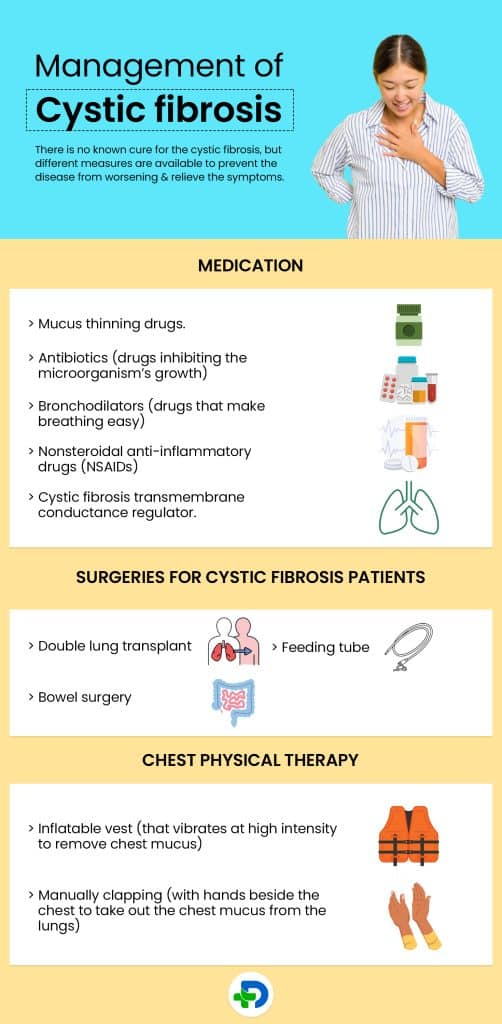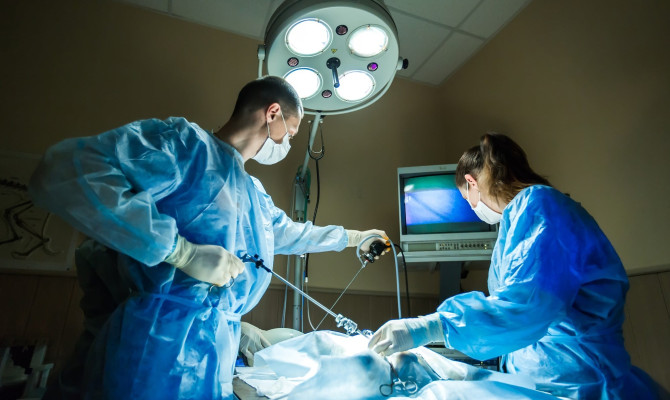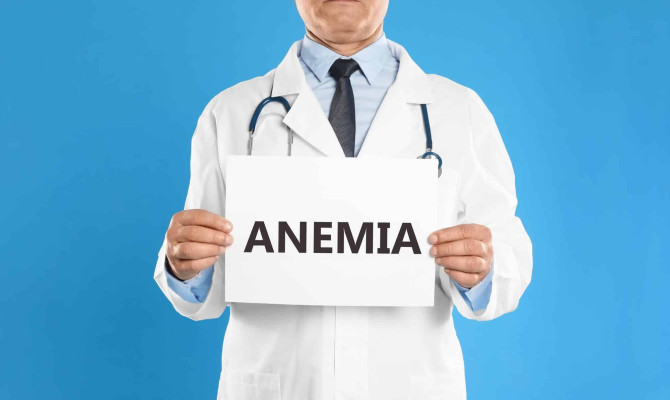Cystic fibrosis : A General Overview

- Cystic fibrosis
- 14 Aug 2023
Overview
What is Cystic fibrosis?
Cystic fibrosis is a severe genetic disease that causes serious harm to the digestive system, lungs, and different body organs. Cystic fibrosis attacks the sweat, digestive juices and mucus-secreting body cells and causes the secretion of sticky and thick fluids. The fluids secreted in normal individuals are non-sticky, greasy and thin, preventing the organs and tissues from drying out.

Facts
Facts about Cystic fibrosis
- Cystic fibrosis is a chronic disease that worsens with time and requires everyday care.
- Cystic fibrosis attacks organs such as the intestine, liver, pancreas, and lungs.
- A faulty gene (segment of deoxyribonucleic acid) due to gene mutation (change in the deoxyribonucleic acid fragment) of the cystic fibrosis transmembrane conductance regulator(CFTR) gene causes the secretion of thick and sticky fluids.1Facts | Researched based study from Nlm.nih.gov
- The sticky fluids block the ducts and tubes of the pancreas and lungs .
- The thick fluids obstruct functions such as the smooth passing of the air to the lungs and may carry bacteria leading to several infections .
- There is no cure for the Cystic Fibrosis disease, but certain treatments available can help manage the symptoms and relieve the pain.
- Enhanced treatments in recent times have increased the patient’s longevity, and patients are seen living into their 40s and 50s 1Facts | Researched based study from Nlm.nih.gov
Symptoms
Symptoms of Cystic fibrosis
- Difficult breathing
- Recurrent lung infections(viz; pneumonia)
- Recurrent pancreatitis(pancreas infection that causes swelling and redness)
- Problem with bowel movement (with slimy stool)
- Sterility(infertility) in males
- Difficulty in increasing weight
- Salty sweat secretion from the skin 2Symptoms | Researched based study from Nlm.nih.gov
Symptoms of Cystic fibrosis affecting respiratory organs
The tubes carrying air to and from the lungs are blocked due to sticky mucus secretion and causes
- Shortness of breath with a whistling sound
- Swollen nasal passages
- Chronic cough producing bulky mucus
- Inability to perform strenuous physical activity
- Frequent lung infection
- Repeated sinusitis (infection of the tissues surrounding the hollow cavities of the nasal passages) 2Symptoms | Researched based study from Nlm.nih.gov
Symptoms of Cystic fibrosis affecting digestive organs
The sticky mucus obstructs the tubes carrying digestive enzymes from the pancreas to the intestine resulting in improper absorption of the nutrient substances in the body, results in to :
- Nausea and vomiting
- Bad-smelling sticky stools
- Stomach gas
- Appetite loss
- Malnutrition and reduced growth
- Loss of weight
- Extreme constipation (difficulty in passing stool) leading to partial rectum protrusion
- Intestinal obstruction in newborn baby
- Some other symptoms include
- Late puberty
- Limited growth (in youngsters)
- Merged toes and fingers 2Symptoms | Researched based study from Nlm.nih.gov .
Causes
Causes of Cystic fibrosis
- Cystic fibrosis is caused by a change in the gene (a segment of DNA), viz., the cystic fibrosis transmembrane conductance regulator (CFTR) gene.
- The CFTR gene regulates the fluid (salt and water) movement in and out of the cell. A mutated gene causes cells to produce bulky mucus, obstructing fluid movement. It increases salt in various organs such as the lungs, liver, pancreas, and intestine.
- The mutated gene runs in families and causes the disease. Both the mother and the father must be carriers of the mutated gene to pass the disease to the subsequent generation 2Causes | Researched based study from Nlm.nih.gov .
Diagnosis
Diagnosis of Cystic fibrosis
Sweat chloride test
- It is the standard test for diagnosing cystic fibrosis
- Checks for an abnormal amount of chloride in the sweat 3Diagnosis | Researched based study from Sciencedirect.com
Sputum test
- It checks for respiratory tract infections such as lung infection
- It looks for the type of germs present in the sputum(mucus) 3Diagnosis | Researched based study from Sciencedirect.com
Immuno-reactive trypsinogen test
- Screening Test in newborns for cystic fibrosis
- Checks for the high level of immuno-reactive trypsinogen protein in the blood 3Diagnosis | Researched based study from Sciencedirect.com
Pulmonary function test
- It checks for the proper lung functioning
- It can measure the amount of air breathed in and out
- It also can determine the rate of airflow through the lungs 3Diagnosis | Researched based study from Sciencedirect.com
- Any disturbance in the pulmonary functions is an indication of cystic fibrosis
Chest X-ray
- It checks for any lung swelling
- It looks for any obstructions in the respiratory passages
CT (Computed Tomography) scan
- It uses computers and X-rays to visualize the internal organs of our body
- It checks for the amount of damage caused to the pancreas and liver by cystic fibrosis 3Diagnosis | Researched based study from Sciencedirect.com .
Management

Management of Cystic fibrosis
There is no known cure for the cystic fibrosis, but different measures are available to prevent the disease from worsening and relieve the symptoms.
Medication
Mucus thinning drugs
- It makes the slime less sticky and thin
- It also helps take out the mucus from the lungs through cough
- It improves the lung function
Antibiotics (drugs inhibiting the microorganism’s growth)
- It is given to clear the lung infection
- It prevents further infections
Bronchodilators (drugs that make breathing easy)
- It can be taken as an inhaler
- It relaxes the lung muscles around the air tubes carrying air to the lungs
- It increases the airflow to and from the lungs
Nonsteroidal anti-inflammatory drugs (NSAIDs)
- NSAIDS are drugs to relieve pain and swelling
- NSAIDs like ibuprofen are prescribed for youngsters between the age group of 6 to 17
However, it is not recommended for people above 18 years 4Management | Researched based study from Cysticfibrosis.com .
Cystic fibrosis transmembrane conductance regulator (CFTR) modulators
- CFTR are drugs that improve the abnormal CFTR gene function
- This drug plays an essential role in patient management as it targets the mutated gene (changed gene fragment) rather than other disease effects
Surgeries for cystic fibrosis patients
Double lung transplant
- Surgeons remove the diseased lungs and replace them with the donor’s lungs.
- It extends the life of cystic fibrosis patient
Feeding tube
- A plastic tube is placed into the abdomen to provide nutrition to the patient.
- Cystic fibrosis patients suffer from getting nutrients from food, so a feeding tube is inserted into their abdomen. 5Management| Researched based study from Biomedcentral.com
Bowel surgery
- Surgery was performed to remove a part of the bowel
- Often performed to remove bowel blockage
Chest Physical therapy
It is a technique to clear the airways to the lungs. It helps break the thick mucus in the lungs Mechanically, clearing of the mucus is done by
- Inflatable vest (that vibrates at high intensity to remove chest mucus)
- Manually clapping (with hands beside the chest to take out the chest mucus from the lungs) 5Management | Researched based study from Biomedcentral.com
Care
Tips to take care of patients at home
- Promote enough water intake to prevent dehydration.
- Avoid inhaling smoke and pollen that worsens the symptoms.
- Immunization by taking vaccines regularly for infections like pneumonia and influenza,
- Exercising regularly to loosen the lung mucus.
- Engaging in physical activities like walking, running, and swimming
Complications
Complication of Cystic fibrosis
Some common health issues associated with cystic fibrosis are:
- Nasal polyps (abnormal tissue growth inside the nose linings)
- Pancreas infection
- Male sterility (infertility)
- Insufficiency of vitamins
- Inadequate growth in children
- Serious lung infections
- Hemoptysis ( blood comes out with cough)
- Liver cirrhosis, in which liver tissues become scratched and damaged 5Complications | Researched based study from Biomedcentral.com
Organ specific complications are :
Gastroesophageal reflux disease
- Disorder in which stomach contents move back from the abdomen to the throat
Bronchiectasis
- A lung condition in which the tubes carrying air in and out from the lungs become injured and damaged .
- It causes difficulty in clearing mucus from the tubes.
Cystic fibrosis-related diabetes
- Abnormal sticky mucus damages the insulin-producing pancreatic cells, thereby causing high blood sugar 5Complications | Researched based study from Biomedcentral.com
Pneumothorax
- Air leakage into the space that separates the lungs and the chest
- Causes chest aches and breathing difficulty
Acute exacerbation
- Irresistible cough with thick mucus 5Complications | Researched based study from Biomedcentral.com
- It causes breathing problem
Respiratory failure
- Lung tissue becomes damaged and hinders functioning, which worsens over time.
- Complete stoppage of lung functioning causes death . 5Complications | Researched based study from Biomedcentral.com
Osteoporosis
- It is a bone disease in which bone minerals decreases
- The strength of the bone diminishes, causing breakage of the bone 5Complications | Researched based study from Biomedcentral.com .
Other complication
- Mental issues such as anxiety, depression
- In cystic fibrosis, people have salt secretions in their sweat, which results in an imbalance of minerals in the body, which causes dehydration, fatigue, and low blood pressure.
Prevention
Prevention of Cystic fibrosis
There is no prevention for cystic fibrosis. However, genetic testing (a test to identify variations in DNA sequence) must be performed by couples to rule out the possible chance of having a child with cystic fibrosis. The disease is already present at birth in some organs, including as the pancreas and liver, among children who have two abnormal CF genes, 6Prevention | Researched based study from Cdc.gov but the lungs do not manifest the disease until after delivery. Gene therapy may one day be utilized to stop the development of the lung condition.
Any feedback on this article?
 This Articles content was accurate
This Articles content was accurate Very Informative Article
Very Informative Article I have a question or a comment
I have a question or a comment
 This article contains inaccurate content
This article contains inaccurate content This article was not helpful
This article was not helpful I have a question or a comment
I have a question or a comment
We appreciate your helpful feedback!
Checkout our social pages
References
-
National Library of Medicine
Cystic fibrosis | Introduction
-
National Library of Medicine
A review of cystic fibrosis: Basic and clinical aspects | Cause | Symptoms | Diagnosis
-
Science Direct
Cystic Fibrosis | Diagnosis
-
Cystic - Fibrosis
Ibuprofen Use In Cystic Fibrosis | Treatment
-
BioMed Central
Cystic fibrosis: current therapeutic targets and future approaches
-
Centers for Disease Control and Prevention
Cystic Fibrosis | Prevention





































